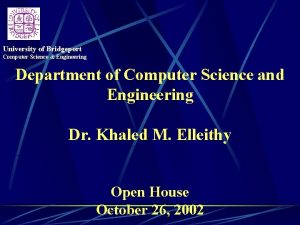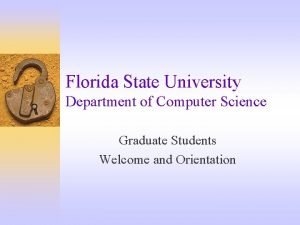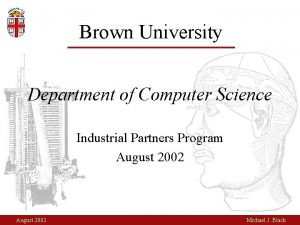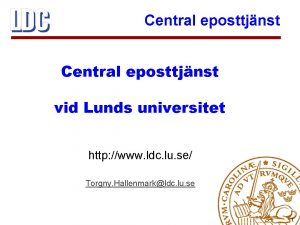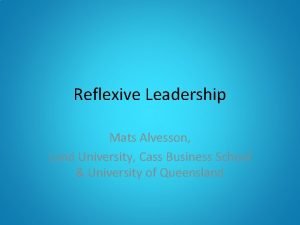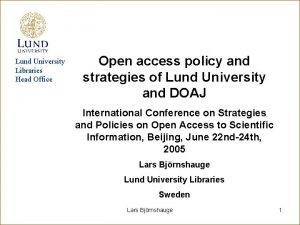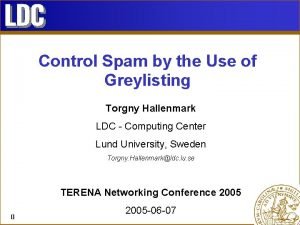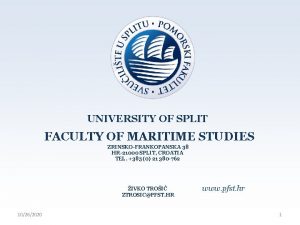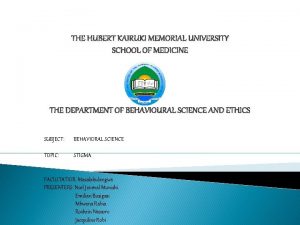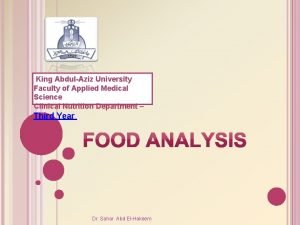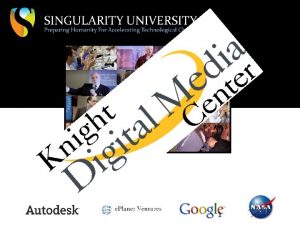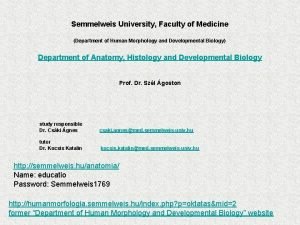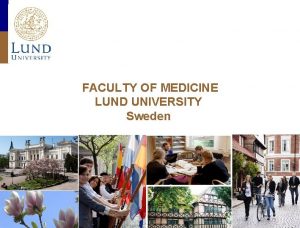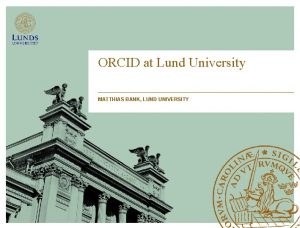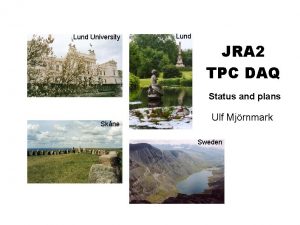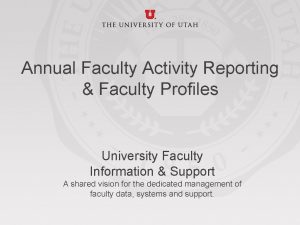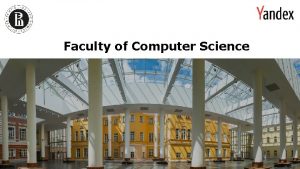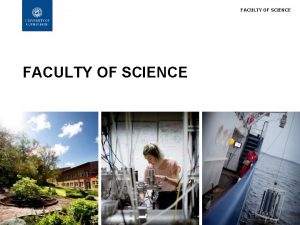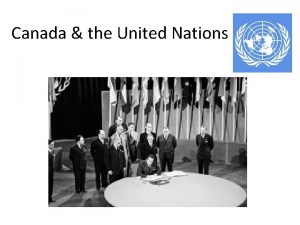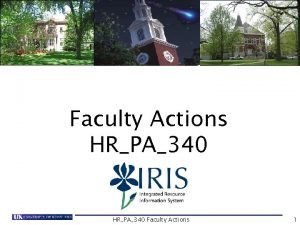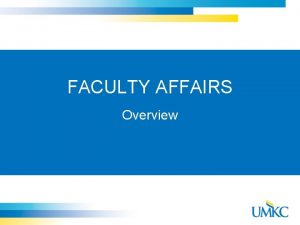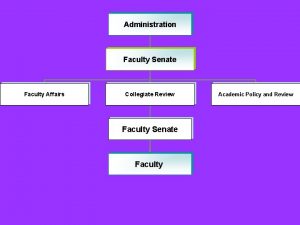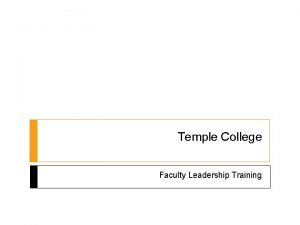Lund University FACULTY OF SCIENCE We are united
















- Slides: 16

Lund University FACULTY OF SCIENCE

We are united in our efforts to understand, explain and improve our world and the human condition.

A world class university • Founded in 1666 • Ranked among the world’s top 100 universities • 40. 000 students (individuals) whereof 20% international • Over 8. 000 employees whereof 840 professors, 4. 560 lecturers, researchers and doctoral students, and 2. 780 technical and administrative staff • 270 education programmes whereof 186 at advanced level • 1. 380 free standing courses

A comprehensive university – 8 faculties • Economics and management • Engineering and technology • Fine arts, music and theatre • Humanities and theology • Law • Medicine • Science • Social sciences

Faculty of Science

The faculty in numbers • 9 departments or other units • 1. 094 employees (1 007 full-time equivalents) • 2 890 students (1 658 full-time equivalents) • Bachelor’s programme with 12 specialisations (3 in English) • The hospital physics programme • 17 master’s programmes with specialisations within the programmes • 22 postgraduate disciplines • 57 doctoral degrees and 10 licentiate degrees

Departments or other units • Centre for Environmental and Climate Science • Centre for Mathematical Sciences • Department of Astronomy and Theoretical Physics • Department of Biology • Department of Chemistry • Department of Geology • Department of Physical Geography and Ecosystem Science • Department of Physics • Division of Medical Radiation Physics

Personnel Full-time equivalents: 1 007 (40% female) • Ph. D students: 305 (45% female) • Other lecturers and researchers: 214 (37% female) • Professors: 123 (25% female) • Administrative staff: 115 (70% female) • Senior lecturers: 97 (22% female) • Career-development positions: 87 (33% female) • Technical staff: 43 (31% female) • Library staff: 12 (80% female) • Lecturers: 12 (42% female)

Funding Total revenue: SEK 1 194 million Central government allocation 54% Government grant providers 20% Other Swedish grant providers 10% Foreign grant providers 7% Applied research 8%

Education • 2. 890 students (1. 658 full-time equivalents) • Bachelor’s programme with 12 specialisations (3 in English) • The hospital physics programme • 17 master’s programmes with specialisations within the programmes • Postgraduate studies (22 postgraduate disciplines)

Bachelor’s programme 12 specialisations: • Astronomy and Astrophysics • Mathematics (in English) • Biology • Molecular Biology • Chemistry/Molecular Biology • Physical Geography and Ecosystem Science (in English) • Environmental Health • Physics (in English) • Environmental Science • Theoretical Physics • Geology

Master’s programmes 17 master’s programmes: • Applied Climate Change Strategies • Astrophysics • Bioinformatics • Biology • Geo-Information Science and Earth Observation for Environmental Modelling and Management • Geology • Chemistry • Geomatics • Environmental Changes at Higher Latitudes • Mathematical Statistics • Environmental Science • Molecular Biology • Environment and Health Science • Physical Geography and Ecosystem Science • Geographical Information Systems • Mathematics • Physics

Postgraduate studies 22 postgraduate disciplines: • Analytical Chemistry • Astronomy and Astrophysics • Biochemistry • Biology • Chemical Physics • Geobiosphere Science, with specialization in Quaternary Sciences • Inorganic Chemistry • Mathematical Statistics • Mathematics • Medical Radiation Physics • Environmental Science • Molecular Biophysics • Geobiosphere Science, with specialization in Geographical Information Science • Numerical Analysis • Geobiosphere Science, with specialization in Lithosphere and Palaeobiosphere Sciences • Geobiosphere Science, with specialization in Physical Geography and Ecosystem Science • Organic Chemistry • Physical Chemistry • Physics • Theoretical Chemistry • Theoretical Physics, with specialization in Computational Biology

Research • Climate change • Animal super senses and development of life on earth • Future materials and effective medicines • Origins of the Milky Way and nature’s smallest components • New opportunities with MAX IV and ESS

World-leading in material science MAX IV Laboratory: European Spallation Source (ESS): • World-leading synchrotron radiation laboratory • Based on the world's most powerful neutron source • Using synchrotron radiation to study materials at the atomic scale • Will be used to study the structure and function of materials such as plastics, proteins and medicines • For scientific breakthroughs within medicine, engineering and science • Expected to be open for research in 2023 • Inaugurated 2016 • Will be used by a number of European countries

 Mikael ferm
Mikael ferm University of bridgeport computer science faculty
University of bridgeport computer science faculty University of bridgeport engineering
University of bridgeport engineering Mch fsu
Mch fsu Brown university computer science
Brown university computer science Lu se webmail
Lu se webmail Mats alvesson lund university
Mats alvesson lund university Mc access
Mc access Webmail lund
Webmail lund My favorite subject is science because
My favorite subject is science because University of split faculty of maritime studies
University of split faculty of maritime studies Hubert kairuki memorial university faculty of medicine
Hubert kairuki memorial university faculty of medicine Semmelweis university faculty of medicine
Semmelweis university faculty of medicine King abdulaziz university faculty of medicine
King abdulaziz university faculty of medicine Mendel university faculty of business and economics
Mendel university faculty of business and economics Singularity executive program
Singularity executive program Territorial matrix vs interterritorial matrix
Territorial matrix vs interterritorial matrix


